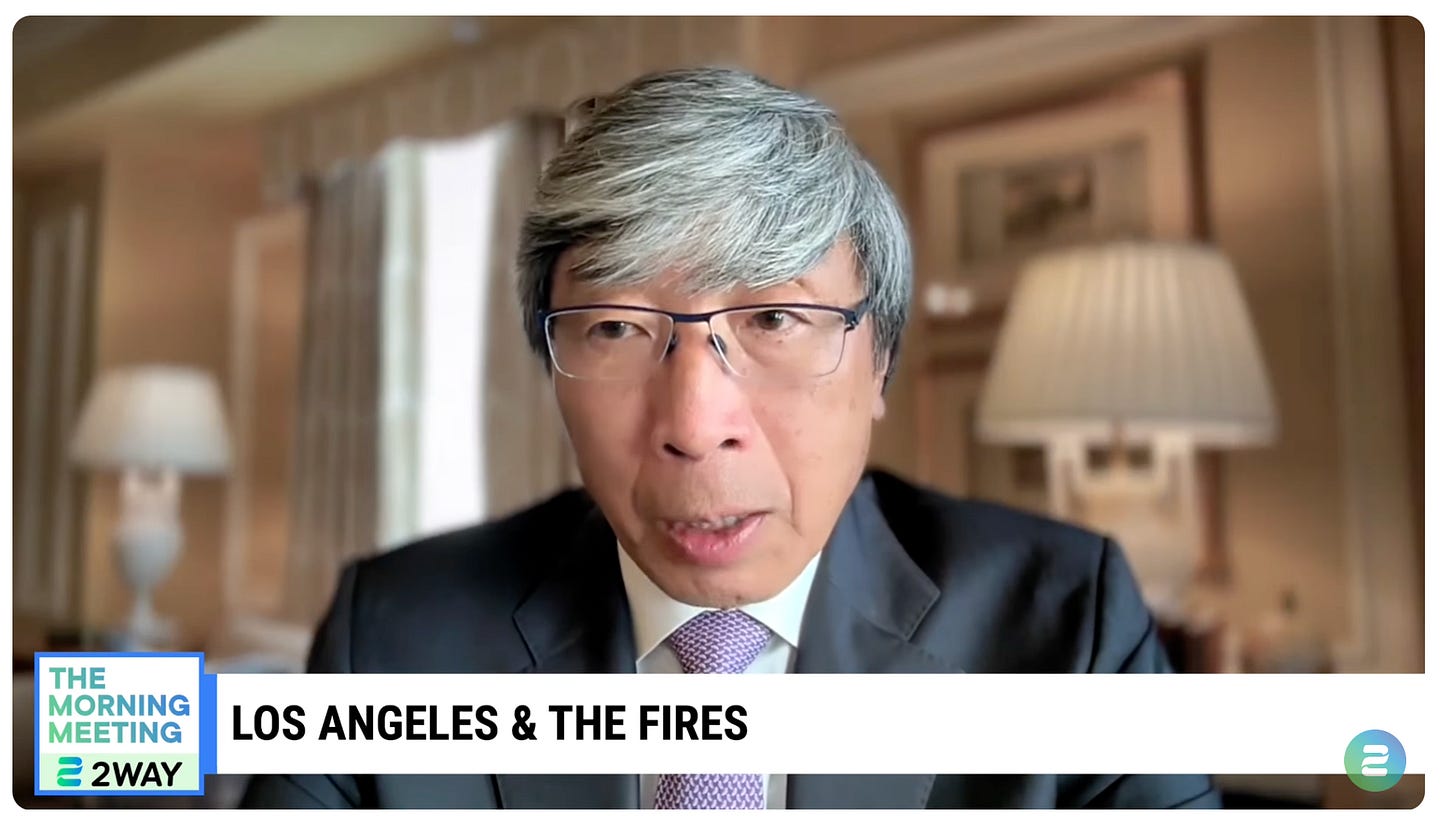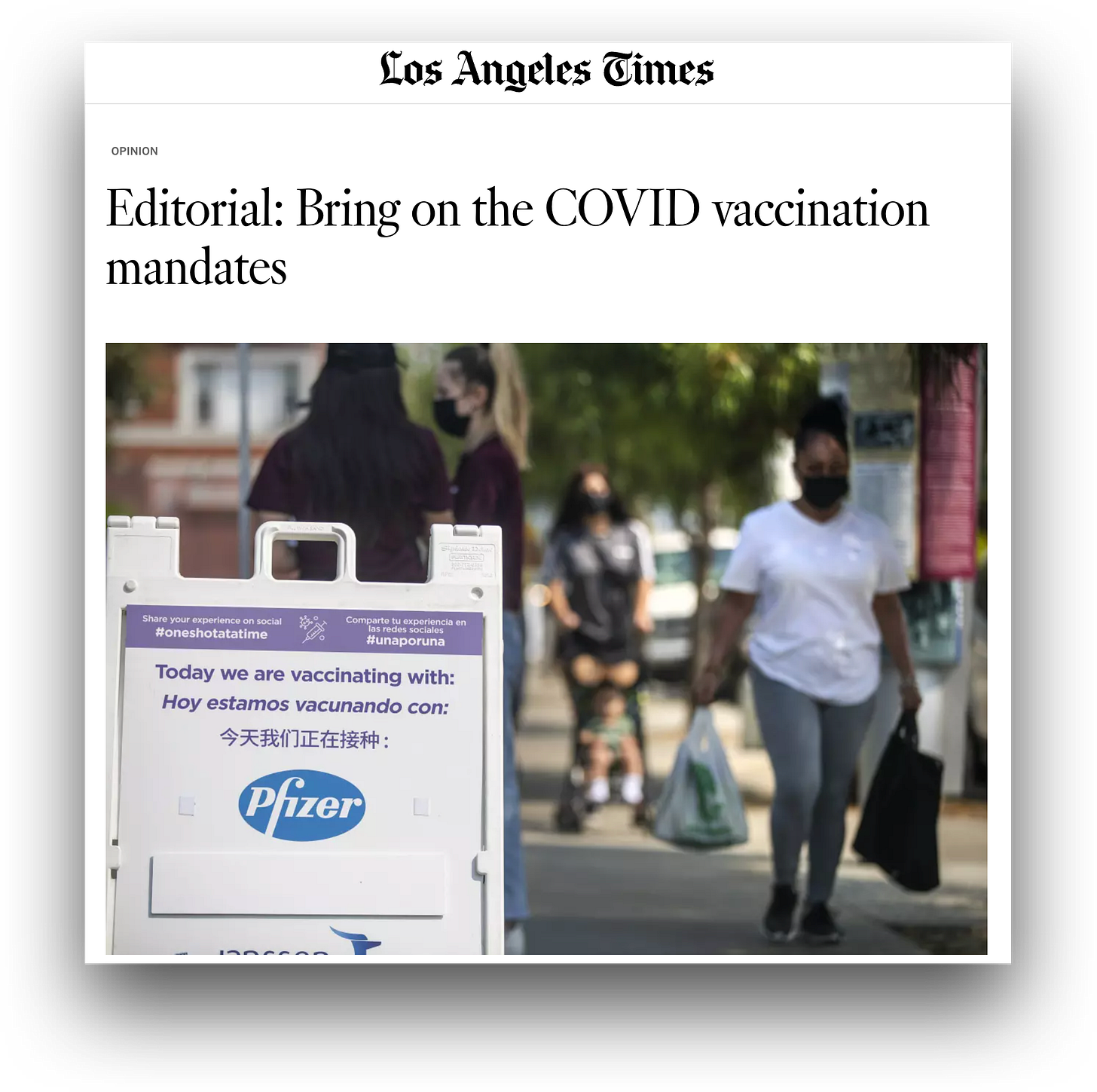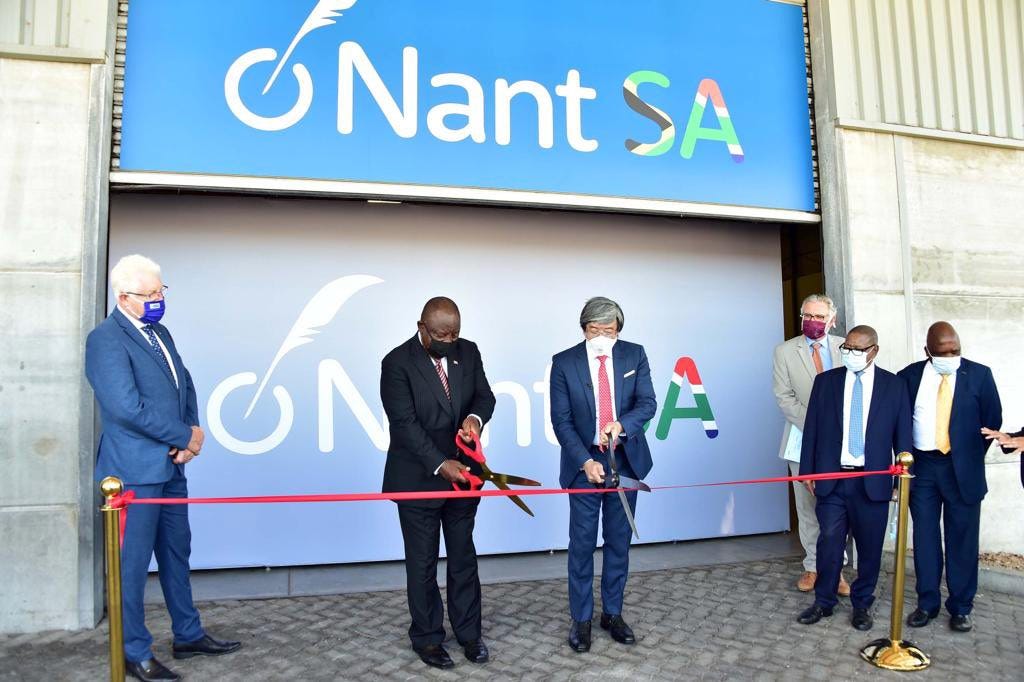The Los Angeles Times' Owner is Building a Vaccine Empire — with His Paper's Help
If you want to own the issue, you need to own the media.
While numerous conglomerate-owned or billionaire-controlled media companies have advanced the pharmaceutical agenda, only one is owned outright by a vaccine-manufacturing, Big Pharma billionaire: the Los Angeles Times.
In 2018, South African-born billionaire physician Patrick Soon-Shiong bought the LA Times, along with its sister publication the San Diego Union Tribune, for $500 million. Soon-Shiong cited “the role that journalism needs to play in a free society” as his reason for buying the papers.
Under Soon-Shiong’s ownership, the LA Times has been one of the most hardline newspapers in the country on the issue of COVID vaccines. “It’s time to get tough on COVID vaccine evaders,” the paper declared in the headline of a July 2021 editorial. Weeks later, the editorial board ran another piece, this one titled, “Bring on the COVID vaccination mandates,” which argued that people who don’t want the COVID vaccines were driven by “mystical reasons.”
Days later, the paper hammered the same idea again with an editorial titled, “There is no absolute right to refuse vaccination,” arguing anyone attending work, college, school or any other indoor setting must be vaccinated. Finally, the kicker came in November 2021 when the LA Times opined, "Young kids should get the COVID-19 vaccine, but not be forced to — yet.”
The paper has been just as uncompromising in its take on the figure on the other side of this issue, Robert F. Kennedy Jr. In November, one of the LA Times’ most prominent columnists called RFK Jr.’s appointment a “catastrophe for public health.” Another columnist argued that RFK would be a “disaster.”
This month, however, Soon-Shiong made a series of startling comments about RFJ Jr. on a viral interview on the 2WAY show hosted by Mark Halperin. “I think people misunderstand Bobby Kennedy,” Soon-Shiong said in the interview, where he praised RFK for his early stance against carcinogenic artificial food coloring. "He’s really all about the science. After hours of sitting down with him, [I can attest that] he knows more about the science than most doctors.”
Given RFK’s long established stance on the COVID vaccines, Soon-Shiong’s recent comments represent such a dramatic reversal they’re almost difficult to make sense of — until we dig a bit deeper.
In 2022, Soon-Shiong again made headlines when he inaugurated a $200 million vaccine manufacturing facility in his native South Africa. The motivation for the move, he said in front of a congressional committee on Africa chaired at the time by the now-embattled mayor of Los Angeles, Karen Bass, was about ensuring "that Africa is making vaccines for Africa.”
That’s a noble sentiment, but it’s not one that justifies such a risky strategic investment. In the closing section of his testimony, however, Soon-Shiong made a deeper point that reveals what his African vaccine initiative is really about:
“We simply cannot continue to rely solely on vaccines that were developed in the early phase of the pandemic at a time when both the virus and our understanding of how to prevent infection and disease have matured. There is a path forward.”
That path lies in what Soon-Shiong calls “second generation vaccines.” These are COVID vaccines based on technology that build on the previous wave of vaccine development and deployment in human populations. In this context, Soon-Shiong is setting out to create what he calls a “universal booster” vaccine, one that can be given as a third shot after either the Pfizer or Moderna vaccine.
Developed by Soon-Shiong’s company Immunity Bio, the universal booster would be a kind of hybrid vaccine — part RNA and part DNA. The idea is that the RNA vaccines would establish antibodies in the patient to fight the virus while the DNA vaccine would activate T-cells to clear the virus from the patient’s body.
For Soon-Shiong, the second-generation vaccine is core to his long-term business strategy. And for good reason. In 2022 (the year Soon-Shiong launched his South African vaccine manufacturing program), Pfizer brought in $38 billion in COVID vaccine-derived revenue alone. That might not be too surprising given that Pfizer is a longstanding pharma giant. But that same year, Moderna — a company that had virtually no significant revenue until the pandemic — saw $18 billion in revenue from its mRNA vaccine.
Launching his South African facility, Soon-Shiong said his aim was to produce 1 billion COVID vaccine doses by 2025. Taking an average price per dose of around $18 (Pfizer charges around $24 per dose for high income countries, and about half that for low-income countries), it’s not hard to see how a potential deal turns ImmunityBio into a global force that can compete with giants like Pfizer and Moderna.
For Soon-Shiong, however, the real prize is cancer. For years, he’s been pounding on a single — and singular — message about the disease, arguing that traditional cancer therapies like chemo and radiation wipe out Natural Killer Cells, the human body’s own inherent anti-cancer therapy. With therapies that harness the power of Natural Killer Cells, Soon-Shiong believes we can change what he calls the “cancer paradigm.”
Launching his South African facility, Soon-Shiong said his aim was to produce 1 billion COVID vaccine doses by 2025.
If he succeeds in this, Soon-Shiong will be able to patent and sell a game-changing therapy for a disease that impacts tens of millions of people each year. This would enrich Soon-Shiong beyond imagination. But it would also establish his name among the pantheon of great scientist innovators like Jonas Salk and Louis Pasteur.
To achieve this, however, Soon-Shiong needs capital. While his personal fortune remains in the billions, his business fortunes have taken a less-than-rosy turn. NantHealth, a healthcare subsidiary under Soon-Shiong’s holding company NantWorks, saw its market cap plunge from a high of around $2 billion in 2016 to $3,250 today — a 99.9% drop in value.
On top of this, as Soon-Shiong himself has admitted, the Los Angeles Times is a massive financial burden, with losses from last year alone totaling somewhere between $30 and $40 million. Soon-Shiong has previously stated that he’s invested “hundreds of millions of dollars, approaching a billion dollars” to keep the LA Times going.
Capitalizing on the COVID vaccine opportunity depends on Soon-Shiong’s ability to win federal contracts and secure export licenses — including for equipment like the bioreactors located in his American facilities that are required in his South African plant. Those decisions will now be made by a figure that Soon-Shiong’s paper had once attacked as uninformed, misguided and barely short of medically evil: Bobby Kennedy.
This explains Soon-Shiong’s recent podcast appearance. But what’s happening at the Los Angeles Times is bigger than that.
In October, Soon-Shiong stirred a major controversy in the media when he refused to allow the LA Times to endorse Kamala Harris for president, leading to the head of the paper’s opinion section to resign. In November, Soon-Shiong blocked an editorial by the LA Times arguing that Trump should not be able to fast-track cabinet confirmations, like that of RFK Jr. Soon-Shiong also pledged to add a “bias meter” to the newspaper’s website and launch a health podcast called Health Decoded.
All this has the ring of media trust-building — as it’s likely intended to. But in reality, it’s brand building. The LA Times is not only one of the country’s most left-wing newspapers, it’s also (as we’ve seen) been among the most strident on vaccine mandates. By flipping the editorial stance and cozying up to Kennedy, Soon-Shiong is creating an opportunity to transform the LA Times from a reputational liability into a point of leverage.
As owner of the sixth biggest US newspaper at his disposal, Soon-Shiong can play Big Pharma’s media game far more effectively than Pfizer and Johnson & Johnson, who are competing to advertise their products against valuable news content. Soon-Shiong is now both publisher and advertiser. The real lesson is that if you want to own the issue, first you need to own the media.
For more more investigative pieces on media malfeasance, follow me on Instagram or X.




